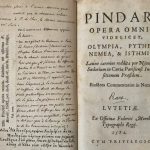PINDAR; LE SUEUR, Nicolas, (Tr.). Opera omnia, videlicet, Olympia, Pythia, Nemea, et Isthmia
Paris, Federici Morelli Typographi Regij, 1582.
£ 3,500
8vo, ff. (viii) 36, 50, 77 (iii), *8 A-I4 A-M4 N2 A-S4 T8. Italic and Roman letter, a little Greek. Each ode with title-page, of which only the Nemean bears the printer’s device (a fountain). Woodcut headpieces and decorated initials. Ownership inscription on verso of rear flyleaf: “Ex libris P. Clerici 10 Jul. 1655”; C19th handwriting: “rare” on t-p and extensive notes on verso of front endpaper: “une inscription placée à l’avant-dernière garde constate que ce charmant volume a appartenu à P. de Clerc, le savant commentateur du XVII° siècle”; beneath, a long passage by the same hand reports Abel-François Villemain’s judgment on the translator of this book, Le Sueur, plus two Greek couplets written by him in praise and imitation of Pindar; on the side, in vertical, a French bookseller label. Light marginal browning throughout, occasional underlining and marginalia in red, blue, and black ink, or pencil. In late C19th brown morocco and paper over boards, gilt-tooled title to spine and marbled pastedowns, a.e.r.. A fine copy.
This beautiful edition of Pindar’s Odes was translated into Latin by Nicolas Le Sueur (Nicolaus Sodorius), who presided over the Inquisition of Paris, as one can gather from the title-page. According to the C19th politician and writer Abel-François Villemain, Le Sueur was a magistrate within the Parliament of Paris, whose Latin translation of Pindar shows great eloquence and linguistic skills. Le Sueur dedicated the parts composing this work to different leading characters of his time: King Henry III, the President of the Parliament Christophe de Thou and the politician Philippe Hurault de Cheverny.
Bibliography: Brunet IV col. 662; Renouard 1580 16:10:1; FB 82965; USTC 170634.






